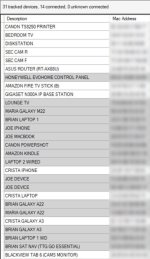Oddly enough I have the same issue with two old Android Tablets I use with Google Home and a few Nest cams, one specifically to monitor my disabled son's room, he has a seizure disorder. For some time we've had those drop offs of the tablets over Wifi, one (about 10ft farther) more that the other, regardless of Merlin code versions.
Partially, probably mostly my doing. I found the tablets moving between the router (AX88) and AIMesh nodes (AX86) as they connected reconnected, killing the video feed. Because I also have SmartConnect setup I found them switching between 2.4Ghz and 5Ghz (had to enable debug mode in Android to see it). Disabling the "Roaming Assistant" under wireless/professional for both 2.4/5 helped a bit but still had the problem just a little more infrequently. Also helped the Nest cams that would occasionally also drop off in the same manner.
Only after I have bound the Tablets and cameras to the physically nearest AP (in this case the main router - AX88 for the Tablets and AX86 for the camera) has it stabilized to the point that its a rare event that they drop. What I probably need to do is work on the SmartConnect rules to better align to my environment. But binding the devices to the nearest AP, while not the best solution, fixed my issue.
In my case private/random MAC addresses made no difference, other Android/Apple devices in my home and have no issue, other that connecting to the nearest AP as they roam about the house. Got two new Wifi6 enabled tablets coming soon (my 160Mhz/DFS is rock solid) and going to set them up the same way.
This approach works for me, your mileage may vary...


